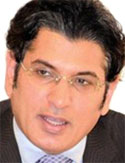GCC Seeks Results at Camp David

By Mohammed Fahad Al-Harthi
13 May 2015
Camp David is a name carved into the Arab world’s political memory for being central to several far-reaching agreements over the years. In particular, the retreat hosted the Egyptian-Israeli peace agreement, ushering in a new phase in the region’s history.
There are understandably great expectations that the meeting on Thursday between Gulf Cooperation Council (GCC) leaders and US President Barak Obama will achieve a new mutually beneficial agreement, coming as it does in the wake of policy differences on several critical issues facing the region.
Many Gulf leaders feel that Washington needs to have a clear commitment to security concerns here. The issue is not only Iran’s nuclear ambitions but also its expansionist policies, which have included supporting militias that are a threat to the region. In Washington, it is clear that US politicians know the importance of this summit, which negates reports of a strain in Gulf-US relations.
Gulf nations are coming to this meeting on a different footing. A successful political and military alliance, led by Saudi Arabia, has culminated in Operation Decisive Storm. The war has shown that Gulf leaders are willing to take action on their own without the traditional involvement of the United States.
There have been differences in approach on several issues in the region recently. Many countries in the region criticized the US hesitation on the Syrian issue. The White House position on Egypt after the fall of the Muslim Brotherhood surprised many countries here and exposed fundamental disagreements. On Yemen, the US was passive even when it saw the Houthis’ expansion from Sanaa into Aden, which forced Saudi Arabia and others to take action.
It is clear that Gulf leaders want this meeting to be fruitful with results that will change the situation on the ground. Positive statements and assurances are not enough unless they are translated into a clear strategy based on firm agreements. There is no time to lose, the region is beset by terror groups that are occupying countries and threatening the world’s stability.
It is not an overstatement to say that there is a battle for the very existence of Arabs taking place in the region, exacerbated by internal power struggles. The Gulf, through the GCC’s effective and efficient political system, has the ability to change all this and secure peace and stability for everyone.
Washington also has a role to play, not only because of its energy requirements and protection of corridors needed for the flow of oil, but also from a security perspective. The world does not consist of isolated islands and chaos in one region can easily spill over into others.
The situation of Iran is the hottest issue currently. It is wrong to reward Iran for its imperialist designs by signing a deal with it. The country is an important player in the region but must be part of the solution. Its leaders must respect the sovereignty of neighbors and stop stoking the fires of sectarianism.
Iran has not shown that it has changed this ideology despite the optimism created when Hassan Rouhani became president. Their involvement with the Houthis proves their frenzied hegemonic ambitions in other countries.
Gulf leaders therefore see action against Iran’s expansion in the region as a key issue. The country has become the common factor in the region’s crises, including Iraq, Syria, Lebanon and now Yemen. So the issue is not only Iran’s nuclear weapons but its policies to undermine Arab nations.
While the Gulf states consider the summit a positive step, they ultimately want decisions that would protect their sovereignty and security. Nothing less would suffice.
Source: http://www.arabnews.com/columns/news/746236

No comments:
Post a Comment